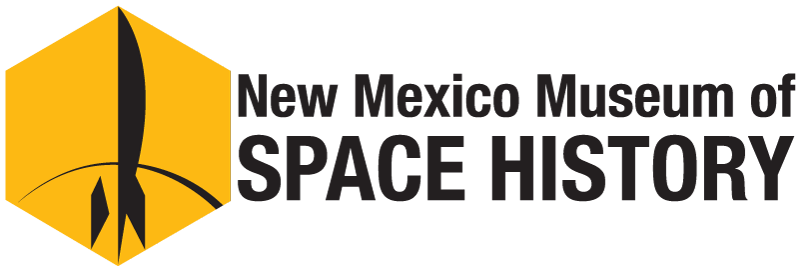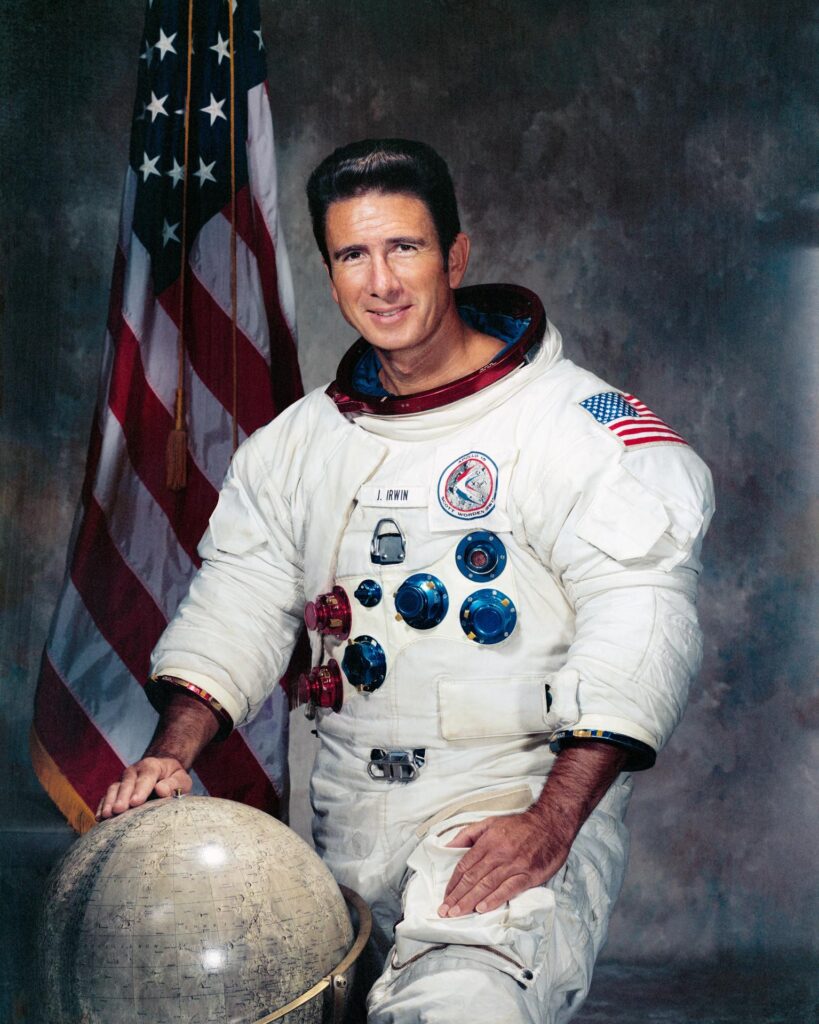Lunar Module pilot on the Apollo 15 lunar landing mission.
James B. Irwin was born on March 17, 1930 in Pittsburgh, Pennsylvania. The son of a steamfitter, he became fascinated with science at an early age, and was especially interested in dinosaurs. A graduate of East High School in Salt Lake City, Utah he received a Bachelor of Science degree in Naval Science from the United States Naval Academy in 1951, and Master of Science degrees in Aeronautical Engineering and Instrumentation Engineering from the University of Michigan in 1957. He also has honorary degrees from the University of Michigan (1971), William Jewell College (1971), and Sanford University (1972).
Irwin graduated from the Squadron Officer School at the Air Command and Staff College, the Air Force Experimental Flight Test Pilot School, and two years later passed the Air Force Aerospace Research Pilot School. He was one of nineteen astronauts selected by NASA in April 1966. He first commanded the two-man Lunar Test Article team, then served as a member of the astronaut support crew for Apollo 10, as the backup Lunar Module pilot for Apollo 12, and was later on the backup crew for Apollo 17.
James Irwin was the Lunar Module pilot for Apollo 15 and spent almost three days exploring the surface of the Moon. Launched on July 26, 1971, Apollo 15 was the fourth manned lunar landing mission and the first to visit and explore the rough terrain of Hadley Rille. After establishing lunar orbit on July 30, Irwin piloted the Lunar Module Endeavor (accompanied by David R. Scott, Spacecraft Commander) to a lunar landing while Command Module pilot Alfred M. Worden remained in orbit in the Command Module Falcon.
Irwin and Scott remained on the lunar surface for 66 hours and 54 minutes, longer than any previous Apollo mission. They spent more than nineteen hours outside Endeavor during five separate extravehicular excursions on the lunar surface and were the first to use Lunar Rover 1, a specially designed electric car that they drove a total of eighteen miles.
Scott and Irwin collected approximately 180 pounds of lunar surface materials. They deployed an Apollo Lunar Surface Experimental Package that involved the emplacement and activation of surface experiments. Their lunar surface activities were televised in color, using a TV camera operated remotely by ground controllers stationed in the mission control center in Houston, Texas.
Other Apollo 15 achievements included the largest payload ever placed in earth and lunar orbits, the first scientific instrument module bay flown and operated on an Apollo spacecraft, the longest distance traversed on lunar surface, the first use of a lunar surface navigation device (mounted on the lunar rover) and the first sub-satellite launched in lunar orbit. Apollo 15 returned safely to Earth on August 7, 1971 with a Pacific splashdown and subsequent recovery by the USS Okinawa.
In his one spaceflight, James Irwin logged 295 hours and 11 minutes in space, including over 19 hours in extravehicular activity on the lunar surface.
Among Irwin’s many awards are NASA’s Distinguished Service Medal, the Air Force Distinguished Service Medal and Command Pilot Astronaut Wings, two Air Force Commendation Medals for service with the Air Force Systems Command and the Air Defense Command, and an Outstanding Unit Citation while a member of the 4750th Training Wing. He was also awarded the City of New York Gold Medal (1971), the United Nations Peace Medal in 1971, the City of Chicago Gold Medal (1971), the Air Force Association’s David C. Schilling Trophy (1971), the 1971 Kitty Hawk Memorial Award, the AIAA Haley Astronautics Award for 1972, the Arnold Air Society’s 1972 John F. Kennedy Trophy, and the Robert J. Collier Trophy for 1971.
James Irwin retired from the Air Force with the rank of colonel in 1972. He resigned from the Astronaut Corps at the same time to found the High Flight Foundation, an inter-denominational evangelical organization based in Colorado Springs, Colorado. Irwin often spoke of the lunar mission as an epiphany. While on the Moon, at the end of the first day exploring the rugged lunar highlands, he said he was reminded of “my favorite Biblical passage from Psalms.” Speaking by radio to Mission Control in Houston, he began quoting the passage, “I’ll look into the hills from whence cometh my help,” and added quickly, “but, of course, we get quite a bit of help from Houston, too.”
Colonel James Irwin died on August 8, 1991 in Glenwood Springs, Colorado, of a heart attack. He is buried in Arlington National Cemetery.

